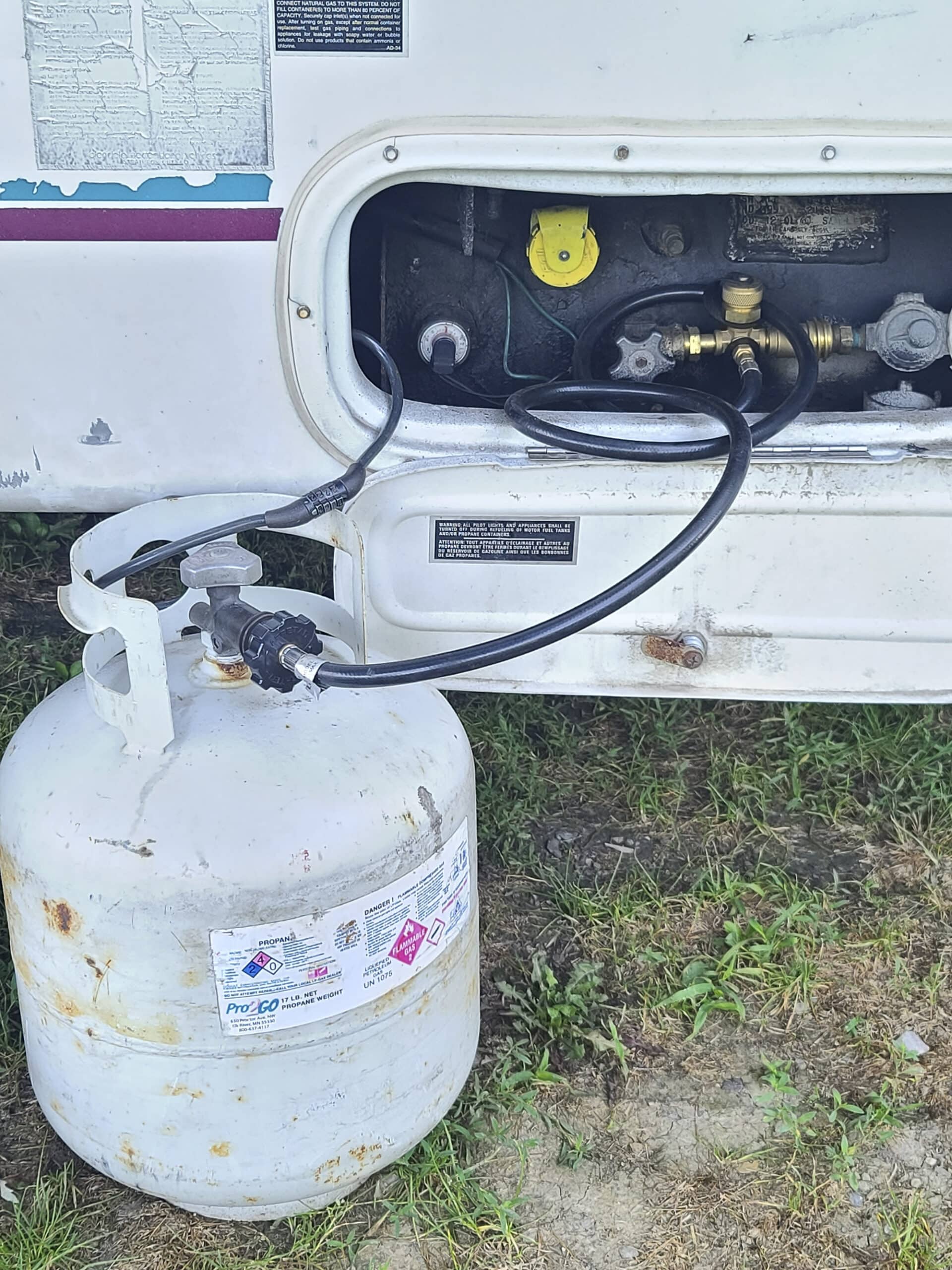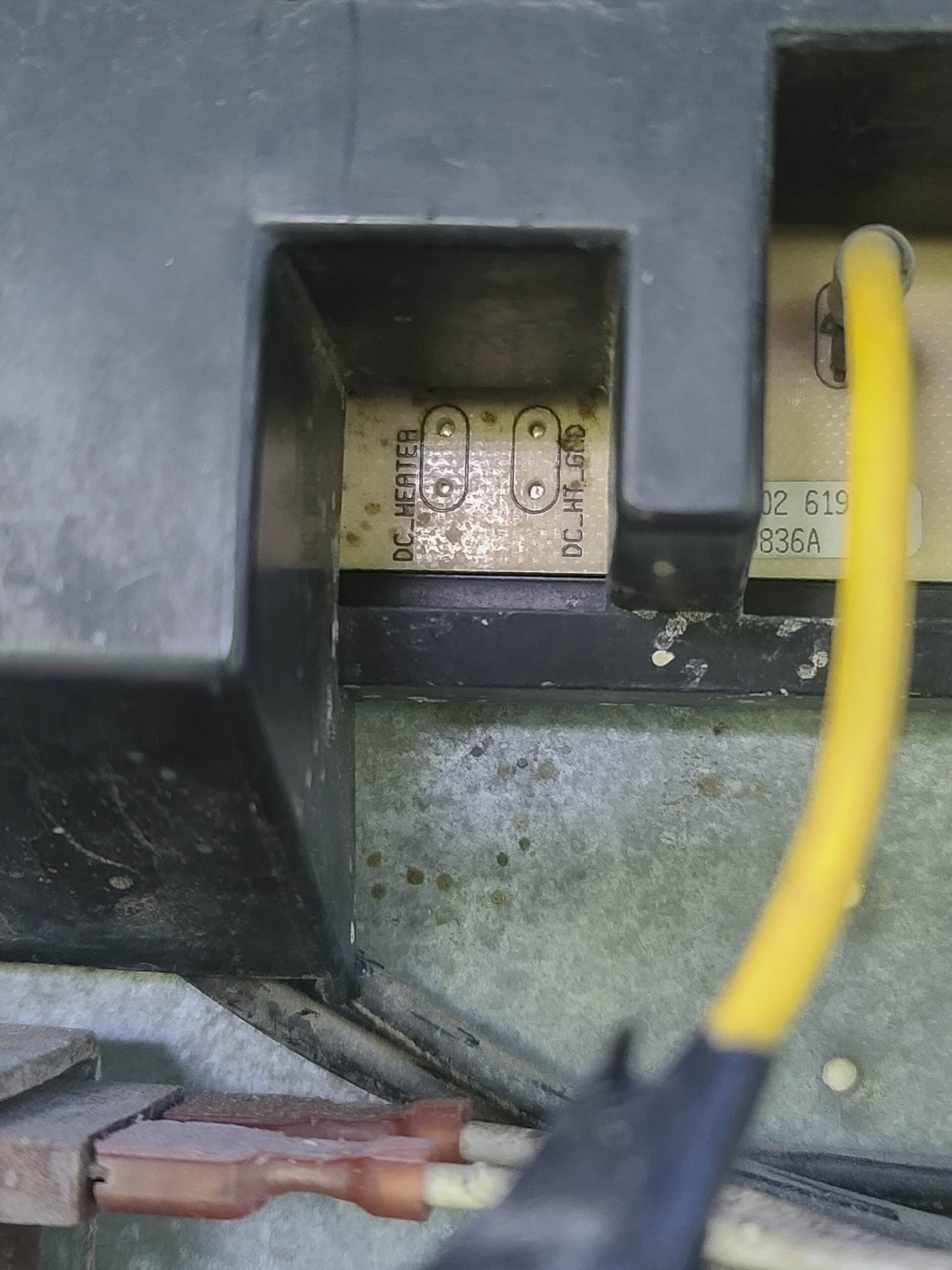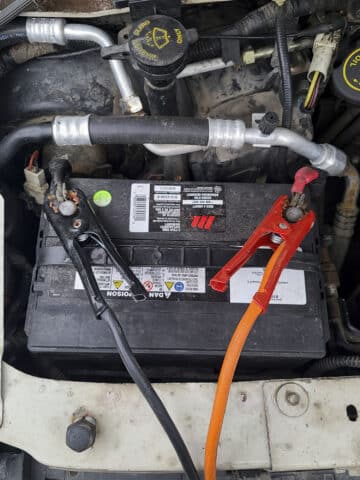Your RV fridge could run on battery, propane, or shore power. This post will help you determine what is needed to keep your cool!

Know your equipment!
It's a good idea for every RV owner to know the details of your equipment so you won't be get stuck in a bad place while on the road or dry camping.
Today we're going to explore RV fridge use and their requirements.
There are various types out there, and those RV fridges work in different ways. Let's dig in to the different types and you can look at the section that matches your fridge model.
Types of RV fridges
Your RV fridge works differently than your residential fridge. Residential refrigerators use a compressor system to pump the coolant around.
This is why they are sometimes called compressor refrigerators. A compressor fridge compressed a gas refrigerant to a liquid, cools it, then returns it to a gas to get cold air.
You may have heard that RV fridges are propane refrigeration, but the propane itself is the fuel, not the refrigerant.
You're most likely to have a type of RV refrigerator that uses a heated ammonia process to create the cool internal temperature zone. These types of RV fridges are called absorption refrigerators.
I'll spare you the lesson on how you can use hot air to make cold air. It means that we can use a heat source as the primary power to create a cold fridge.
Without any moving parts, RV fridges are very reliable.
How do I know what type of refrigerator I have?
The best way to get all of the information you can is to do an internet search of your brand and model fridge.
Alternatively you could open the cover on the outside of your RV and inspect the area.
A quick inspection of mine shows low voltage electrical lines and a propane line. An AC outlet with a cord is also running to the fridge.

This alone can be deceiving. It turns out that my RV absorption fridge cannot use 12 volt DC power as the only power source.
I need to remove another cover to show that the DC power is merely on a 5 amp fuse. This is not nearly enough 12V power for the heat source.
I can even see there's a spot on the control board to attach the DC heater, with no wires connected.
This is also seen on the front control panel, where I have options of AC power or propane, but no option for battery.

Needs of each type of RV fridges
Propane-powered RV refrigerator
It's very unlikely that you have an RV fridge that only runs on liquid propane gas (also known as lp gas). There is likely another energy source.

There would be no indicator lights or sort of logical controls involved.
If propane is the primary energy source, then it needs an electrical power source to run a small control board with an ignitor. This creates a spark to start the propane flame, after the electric solenoid gas valve opens to allow propane to pass to the burner.
This is almost certainly going to be a 12-volt system. Therefore it will need some power from your RV battery to run.
It won't need much electrical power. This means you can expect it run a long time even if you don't have a fully charged battery.
I tested the power needs on the fridge in our motor home, it used less than ½ an amp of our RV’s battery power.
You cannot manually light the flame on a propane refrigerator for it to run without any electricity.
The system is designed to fail safely. The gas valve that opens to allow propane to flow is spring-loaded to shut off if electricity is removed.
RV propane fridges don't use much propane. We ran our fridge and water heater from a barbecue propane tank for several days. We still had a good amount of propane left when we returned home.
Battery-operated RV fridges - Definitely Needs a Battery!
This kind of system relies solely on battery power for heat and control panel. Most likely it runs on your RV's 12 volt dc battery.
You can expect it to draw a significant amount of power from your house batteries. It will vary with your specific model but I would expect it to pull 20 – 30 amps when running.
This amount of DC power is fine if you're travelling (using the engine to maintain the current) or have a lot of solar panels. It would quickly deplete the batteries in a stock system, meaning a short run time.
AC Powered RV fridges
Though a residential-style refrigerator would use AC power, you're not likely to see compressor-driven refrigerators in the RV world. You can, however, use AC power to heat the ammonia in an absorption RV refrigerator.
Using AC power is simple if you're on shore power or portable generator. It can also come from DC power through an inverter, which essentially makes it a battery-operated fridge.
The fridge in our motorhome pulls about 3 amps of 120V AC power when using this mode.
We try to have our RV fridge run on AC power as much as we can. The less propane we use the better! Propane power is a great option, but finding a gas station that can fill our on-board tank is a hassle.
With this type of fridge you're not likely to have an AC only fridge. If it's capable of running on AC it likely uses 12-volts for the control board and can operated with different energy sources.
2-Way RV Refrigerator Power Needs
Modern RV refrigerators can work with multiple energy sources.
2-way fridges can work on one of two primary power sources. In our case it means the primary energy source can be propane or AC power. The controls, however, run on 12-volt DC power.

What this means, however, is I need to have 12-volt power to have my fridge run. I could have a full tank of propane and be hooked into shore power, but if my 12-volt system isn't working, the fridge won't work.
Two-way fridges are very common in RVs. They meet the needs of campground life and boondocking. You're ready for any type of camping trip.
3-Way RV Refrigerator Power Needs
If you have a 3-way fridge it means the power source can be AC shore power, propane, or DC battery for the heat source. Once again we can expect the control panel to operate on DC power.
Three-way fridges are the best option to maintain your fridge temperature with any power supply.

RV Fridge Power Needs - Conclusion
People often ask if their RV fridge requires 12-volt battery power to run on propane.
The short answer is yes it does; you need to have battery power to operate your RV refrigerator.
The exception to this is if your propane RV fridge requires a pilot light. If it does, it might operate with no electricity.
If you're looking to purchase an RV fridge, look at the 3-way RV fridges. These are the most flexible to accommodate any situation.
Share the Love!If you’ve made one of our recipes, be sure to take some pics of your handiwork! If you post it to Bluesky, be sure to tag us - @2NerdsInATruck, or you can tag us on TikTok, if you’re posting video. We're also on Pinterest, so you can save all your favourite recipes and park reviews to your own boards! Also, be sure to subscribe to our free email newsletter, so you never miss out on any of our nonsense. Well, the published nonsense, anyway! |





Thomas
I have a 3 way rv refrigerator. I'm installing in a home made rv. To run the refrigerators control board do I need a inverter or a converter?
Michael Porter
Hello Thomas. I hope your project already includes an RV power converter - allowing you to plug into shore power to charge your batteries. Even if you have a large solar setup, I do recommend this. Since your refrigerator is a 3-way, there's no need to run it from an inverter. You're better off running it from your 12v system and of course using propane when travelling or without shore power.
Kevin
I have a 3 way Norcold 4100. Im having a problem with the propane cooling. I get spark, and blue flame but won't cool. The fan at the top no longer turns on as well. If I plug in to my generator fridge works properly .The plug that is behind the fridge doesn't work. When we switch to DC we get an error code 7. I hope you can help me.
Michael Porter
Well the good news is that it runs on generator, which means it isn't a leak. When it's on propane, does it stay lit after the initial flame, or does it go out in a few seconds? If it continues to run, that's really confusing why it won't cool. Note, it does take quite a while to start cooling, if the flame stays on, check the inside cooling fins after an hour. If it doesn't stay running, the fridge thinks it's not working well and is shutting it off for safety. There may be a flame sensor that isn't working properly. I had to change the flame sensor on my water heater when the flame wouldn't stay running.
As for it not running on DC, there are different things that could be wrong. Running off of 12v takes a lot of power, if the battery can't keep up the voltage drops and the fridge will give that error. If that's not the issue, check fuses and wire connections (they can become corroded). If it still doesn't work, it's possible the 12v heating element has failed.
I have to admit I'm confused about the plug behind the fridge not working, that should become energized when you're on generator (or shore power) which runs the fridge. If your fridge works under generator without that plug becoming active, then perhaps it's running on 12v mode and the generator (along with the RV power converter) is supplying enough 12v DC power to run it.
Good luck!
Kevin Detlor
Thank you for your feedback back!! When I plug in the fridge on ac the fridge continues to run at 250w. Is this normal? Should it turn off at some point?
Michael Porter
In my experience it can run almost continuously in warm weather, and that's about how much power mine takes as well. It's going to depend a lot of your location, coolness settings, and how often you open the fridge. In general this style fridge does run a lot more often than a standard residential fridge. As long as it's keeping your food cool enough I wouldn't worry about it.